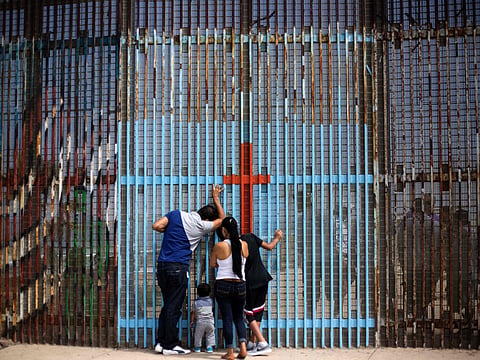Fix US immigration, it what voters want
Trump has a mandate to stop illegal immigration and cut the influx of low-skilled immigrants that undermines American workers

Donald J. Trump smashed many orthodoxies on his way to victory, but immigration was the defining issue separating him from his primary opponents and Hillary Clinton. Trump now has a clear mandate not only to stop illegal immigration, but also to finally cut the generation-long influx of low-skilled immigrants that undermines American workers.
Yet many powerful industries benefit from such immigration. They’re arguing that immigration controls are creating a low-skilled labour shortage.
“We’re pretty much begging for workers,” Tom Nassif, the chief executive of Western Growers, a trade organization that represents farmers, said on CNN. A fast-food chain founder warned, “Our industry can’t survive without Mexican workers.”
These same industries contend that stricter immigration enforcement will further shrink the pool of workers and raise their wages. They argue that closing our borders to inexpensive foreign labour will force employers to add benefits and improve workplace conditions to attract and keep workers already here.
I have an answer to these charges: Exactly.
Higher wages, better benefits and more security for American workers are features, not bugs, of sound immigration reform. For too long, our immigration policy has skewed toward the interests of the wealthy and powerful: Employers get cheaper labour, and professionals get cheaper personal services like housekeeping. We now need an immigration policy that focuses less on the most powerful and more on everyone else.
It’s been a quarter-century since Congress substantially reformed the immigration system. In that time, the population of people who are in this country illegally has nearly tripled, to more than 11 million. We’ve also accepted 1 million legal immigrants annually - and a vast majority are unskilled or low-skilled.
Some people contend that low-skilled immigration doesn’t depress wages. In his final State of the Union address, President Barack Obama argued that immigrants aren’t the “principal reason wages haven’t gone up; those decisions are made in the boardrooms that too often put quarterly earnings over long-term returns.” Yet those decisions are possible only in the context of a labour surplus caused by low-skilled immigration. In a tight labour market, bosses cannot set low wages and still attract workers.
After all, the law of supply and demand is not magically suspended in the labour market. As immigrant labour has flooded the country, working-class wages have collapsed. Wages for Americans with only high school diplomas have declined by 2% since the late 1970s, and for those who didn’t finish high school, they have declined by nearly 20%, according to Economic Policy Institute figures.
No doubt automation and globalization have also affected wages, but mass immigration accelerates these trends with surplus labour, which of course decreases wages. Little wonder, then, that these Americans voted for the candidate who promised higher wages and less immigration instead of all the candidates - Republicans and Democrats alike - who promised essentially more of the same on immigration.
America has always offered a basic deal: If you’re willing to work hard and play by the rules, you can make a better life for yourself and your kids. But without good wages, this deal seems impossible, which is one reason so many Americans think their children will be worse off than they are. These Americans see cheap immigrant labour as a way to enrich the wealthy while creating a near permanent underclass for whom the American dream is always just out of reach.
Yet, as if Trump’s campaign never happened, companies in labour-intensive industries want to sustain or even increase current immigration flows. It’s not hard to understand why. Cheap labour helps the bottom line. It is hard to understand why so many politicians would go along. The short-term interest of businesses isn’t the same as the long-term national interest.
Our country, like any country, needs borders and must decide who and how many can cross those borders. We must make this decision with the well-being of all our citizens in mind. Today, that means a large reduction in legal immigration and a reorientation toward ultra-high-skill immigrants.
This policy would resemble the immigration systems of Canada and Australia, countries with similar advanced economies. While our system gives priority to reuniting extended families and low-skilled labour, their systems prize nuclear-family reunification and attributes like language skills, education and work experience. A similar system here would allow in immigrants like doctors to work in rural areas while not pushing down working-class wages.
In some quarters, proposals like these invoke cries of “nativism” and “xenophobia.” But recent immigrants are the very Americans who have to compete with new immigrants for jobs. Far from being anti-immigrant, this proposal would give recent arrivals a better shot at higher wages, stable work and assimilation.
We have an immigration policy today that few Americans support or voted for. It’s allowed legal and illegal immigration at levels divorced from what our economy needs. That has undermined the earning power of those Americans least able to afford it.
But in this election, Americans finally demanded an end to this unthinking immigration system. Trump and Congress should take that mandate and act on it promptly in the new year.
Tom Cotton is a Republican senator from Arkansas.



